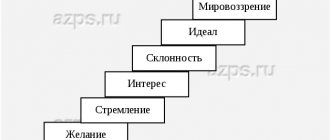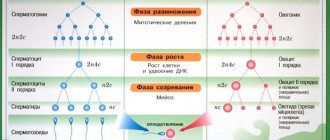The place of personality within social philosophy
As we have already noted, the problem of man, and in particular of him as an individual, is central within the framework of social philosophy. Solving this problem involves finding answers to such significant questions as “What is a person?” “What is the unity and difference in the concepts of man, individuality and personality?”, “What place does personality occupy in social life?”, “What role does personality play in social reality, in particular in the historical context?”
When we talk about personality, we immediately mean a specific person who has specific abilities, character and beliefs that distinguish him from everyone else. These can be interests, value orientations and other qualities that make a person who he ultimately is. None of us applies the concept of “personality” to representatives of the animal world, since we realize that animals have completely different, instinctive traits.
Thus, those concepts that have already been developed in the scientific field and relate to the concepts of “person” and “personality” are largely identical and do not cause debate among representatives of different scientific directions. But still, researchers from social philosophy have questioned identity, recognizing that all interpretations have a single basis - the definition of the individual as a representative of the human race.
In addition to the above characteristics, personality also has psychophysiological criteria that reflect the characteristics of a particular human individual, his individuality. This may be temperament, inclinations for some activity that other people are not endowed with. This is what gives each personality a unique, largely original form. Thus, personality is a dialectical unity of both the general (physiological characteristics) and the specific (psychological characteristics and inclinations). It also includes characteristics that connect a given person with the social environment. His behavior, activities, any actions - all this is reflected in the state and composition of the surrounding reality, and on other people.
What determines a person is, first of all, the relationship he has with his environment. The functions that a person performs in the life of society are also very important. He can be the engine of social progress, doing good deeds and directing his energy in the right direction, but he can also be a pest who does not obey any social and moral norms and laws. Of course, everything depends on what a person’s primary socialization was, his upbringing, what norms and values were instilled in him at the initial stages of his life, in his family and in his immediate environment.
Note 2
The problem of personality in social philosophy is that not every person can become it.
There are several categories of citizens who, despite possessing all human characteristics, cannot be explained as individuals or persons. This:
- marginalized,
- criminals,
- persons without a fixed place of residence,
- people from disadvantaged families,
- people exhibiting aggressive (antisocial, deviant) behavior,
- people who have bad habits that contradict social norms.
In this case, social philosophy is faced with the question of which group to classify these people into, and whether it is possible to develop individuals from them even at the very last stages (for example, when a person has reached a sufficiently adult age and may not be amenable to correction).
Page 20 of 32Individual, individuality, personality
Individual is a designation for the individual in contrast to the aggregate, the mass; an individual person - as opposed to a team, group, society as a whole. The term “individual” usually denotes a single representative of a particular community (worker, farmer, businessman), and the specific features of the real life and activities of a particular person are not included in the content of the concept “individual”. “Individual” is a person as a single representative of a whole - a biological species, a social community, a group.
The human individual is characterized by the following characteristics.
1. External human appearance. The most important here are: the structure of the body, its organs and the vital forces and needs associated with them; upright walking (the forelimbs are free and are used to manipulate objects, tools, etc.); the special structure of the larynx, capable of articulate speech; the absence of significant hair on most of the body, which significantly increases tactile sensitivity and at the same time creates greater vulnerability to temperature fluctuations; highly developed central nervous system and brain.
2. Ability to think.
3. Ability to work.
Individuality is the unique originality of any phenomenon, individual being, person. Each person has not only universal (mind, will, feelings, ability to work), and individual (personal) social qualities and properties that distinguish this person from other people. Individual qualities include the following: 1. Independence of individual existence: the ability to be oneself, to act based on one’s own motives, maintaining identity (agreement) with oneself, to be independent within one’s whole (clan, family, team, society); 2. Integrity or indivisibility; this means that the qualities and properties of a given personality are inseparable from it and do not exist as something independent of a given individual; each person has a clear consciousness of the orderliness and internal integrity of his subjective world, in the system of which he considers all his experiences (sensations, ideas, feelings, desires and inclinations, etc.), assigning each of them its place in this system; 3. Uniqueness and originality of individual existence: each person is unique, unique in his universal essential manifestations, namely, in mental abilities, feelings, in his character, communication, work, not to mention his appearance and behavior.
If the concept of “individual” reflects all (not only social, but also biological - anthropological, physiological, etc.) characteristics of a given person, then the concept of personality captures the social qualities of a person characteristic of him as an individual.
Personality is a stable system of socially significant traits that characterize an individual as a member of a particular society or community. Personality is the focus, a kind of center of interweaving of various social relations of a person, of a given specific individual. It is social in its essence, but individual in the way of existence and manifestation of this essence. The unity of the social and the individual, essence and existence as a concrete historical unity of opposites is the most important essential characteristic of any personality.
In its original meaning, the word “personality” meant a mask, a role played by an actor in ancient Greek theater. Ancient Greek philosophers did not think of the individual outside the community, outside the polis. At the same time, personality is a very specific person as a system of stable qualities and properties realized in social connections, social institutions, and culture. The term “personality” designates, firstly, the human individual as a subject of relationships and conscious activity; secondly, a stable system of socially significant traits that characterize an individual as a member of a particular society or community. Man is an integral integrity of biogenic, psychogenic and sociocultural elements. Personality in the psychological meaning of this word represents the unity of temperament, talents, inclinations, and character. The social component of personality is associated with the influence of the culture and structure of the communities in which it is included.
The concept of “personality” captures the manifestation of social relations in an individual. That is, social traits of a person appear in the personality. The basic parameters of personality are directly determined by the external social environment. A person’s belonging to a particular society, class, or social group is indicated in his rights, responsibilities, actions and is strictly determined to the individual from the outside by the system of social relations of which he is an element. There are concepts of “socialization”, “level of socialization”, which record the degree of spiritual and social values acquired by each person.
In the concept of “individuality,” the biological and social in each person are in a unique, specific combination. Individuality is what distinguishes one particular person from others. It can be presented in different ways: clearly expressed due to specific physiological and anatomical features or due to the development of such social traits as depth of worldview, willpower, etc. However, in most cases, it is the social component in a person that determines his individuality. It is no coincidence that there is an opinion that this concept arose during the Renaissance, when the multifaceted talent and originality of each of the then masters was especially highly valued.
Individuality in the form of social qualities manifests itself differently depending on age. In childhood, a child, imitating those around him, wants to be, on the one hand, like everyone else, but, on the other hand, better than everyone else, hence the desire to stand out in a group of his own kind. At the stage of adolescence, there is a desire to be different from everyone else. Their own language, tastes, fashion, and possibly “rebellion” are formed. An adult manifests his individuality through society, through a set of socially significant roles that he has to perform. In this case, the role should not be played, but taken seriously in the form of free and interested performance. Therefore, a person, becoming a convinced and free performer of social roles, voluntarily assumes certain obligations. As I. Kant said, it is necessary to “give yourself a law.”
However, at each of the identified stages of individual evolution, the presence of infantilism is possible - a reluctance to express oneself, to work on oneself, to grow, a stop in one’s development. Therefore, it is difficult to be a person, an individual, you must constantly make efforts to create yourself. The sequence of concepts individual - personality - individuality reflects the natural pattern of human development, its various levels of relationship with society.
The human individual becomes an individual only at the social level of development, becoming a personality. There is an opinion that in the phylogenetic aspect this happened to man during the era of the Neolithic revolution, when he became a socio-historical being. In the ontogenetic sense, situations are possible when a person may not become a person without having acquired social experience. Science knows of numerous cases where children who grew up in isolation from people, despite all the measures taken to educate them, did not reveal the presence of human personality traits. In general, the diversity of individuals is one of the indicators of the development of society, a condition for its further progress.
To some extent, searches in the direction of studying the relationship between the biological and the social clarify attempts to outline the structure of man, in which the biological and social are present as elements of the structure.
Thus, there is a variant of the psychological structure of the human personality, consisting of three components: 1) temperament, which is largely determined by the biological in a person, 2) the knowledge-practical level and 3) character, which has a social conditioning. If the first two levels answer the question of how an individual will do something, then knowledge of character allows us to answer the question: what will he do in a given situation?
A similar, but more detailed personality structure was proposed by K.K. Platonov, which has four hierarchically located levels.
The first substructure combines the properties of temperament, gender and age characteristics of the personality and its pathological, so-called organic changes. All these properties depend incomparably more on the physiological structure of a person than on social conditions, and therefore this substructure is completely predetermined by human biology.
The second substructure covers the individual characteristics of individual mental processes, or mental functions. There is still a biological influence here, but most properties already depend on social conditions (thinking, memory, etc.). This substructure, interacting with the others, is formed through exercise. Briefly, it can be called a substructure of reflection forms.
The third substructure of personality includes skills, abilities and habits acquired through personal experience, through learning, but with a noticeable social influence. Skills and abilities are ways of expressing personality in activity. It is through this substructure that the personality in its individual development is most clearly objectified, and it is through this substructure that the individual development of the personality accumulates the historical experience of mankind. Briefly, it can be called the substructure of experience.
Finally, the highest, fourth substructure unites the orientation, relationships and moral traits of the individual. The personality elements included in this substructure do not have direct natural inclinations and reflect individually refracted social consciousness. This substructure is formed through education. It is socially conditioned. Briefly, it can be called a substructure of a person’s worldview, since worldview is the most important and determining component of a person’s orientation.
The proposed psychological structure of personality is universal, since it is applicable to every person; it is also dynamic because it changes for each individual from early childhood until death. It also changes historically due to the fact that each historical era forms its own set of conditions for human existence - material, social, determining the existence of one or another type of personality.
<< Previous — Next >>
| Doctrine of Society |
| Society as a system |
| Social structure of society |
| Society and State |
| Society and culture |
| Specifics of human activity |
| Culture and its types |
| Culture and civilization |
| About laws and patterns in history |
| Variability in the interpretation of historical processes |
| Features of modern world civilization |
| Global problems of our time |
| Prospects for resolving global problems |
| Doctrine of Man |
| Anthroposociogenesis |
| Man and space |
| Biological and social in man |
| Individual, individuality, personality |
| Personality typology |
| Social actions and their meaning |
| The role of culture in the socialization of the individual |
| The main characteristics of human existence: uniqueness, creativity, freedom |
| Values, their nature and classification |
| Characteristics of moral values and their hierarchy |
| Origins of moral values |
| Ethics of Responsibility |
| Aesthetic values |
| Interrelation and diversity of religious values |
| Interfaith differences and their manifestations in the system of religious values |
| Value orientations and the meaning of human existence |
| All pages |
The concept of personality in philosophy
The concept of personality in philosophy has always attracted great attention. Within the framework of philosophy, there is a distinction between the concepts of individuality and personality
Individuality is a description of the characteristics inherent in the human race as a whole.
Within the framework of philosophy, there is a distinction between the concepts of individuality and personality. Individuality is a description of the characteristics inherent in the human race as a whole.
Personality, generalizing the philosophical interpretations of different schools and directions, represents, in addition to identifying the general nature of a person, a simultaneous unity of spiritual and physical characteristics, which determines the line of human behavior in life. Personality is the basis for human development throughout his life, because... includes the resolution of ideological (what is the meaning of life), value (what is good and how to behave), aesthetic (what is beauty) and other issues.
Note 1
Personality determines the inner life of a person, determines the concept of the inner “I” and thinking. In addition, personality is the basis for social communication between people.
A person’s full entry into society is associated with the final formation of the individual.
In the tradition of European thought there is personalism, which is precisely formed on the concept of personality. Personalistic tendencies are present in the philosophy of Socrates, Plato, Aristotle, Augustine, Leibniz.
At the end of the $19th and $20th centuries, the direction of personalistic philosophy was formed as an independent phenomenon of thought. The following philosophers are considered to be part of this tradition: N.A. Berdyaev, E. Mounier and others.
Individual and development
Self-improvement, development, accumulation of knowledge - all this happens gradually. The individual is not limited to development in the early stages, but continues to develop dynamically throughout life. It happens that a person reaches the peak of his perfection only in old age.
According to Jung, the most important goal of an individual’s entire life is to find oneself, to find one’s own essence.
This state is akin to the unity of all components, merging into one whole; only the integrity of the individual will give him happiness and bring complete harmony. The pursuit of this goal is called individualization. It implies the desire for integrity of opposing intrapersonal forces. It turns out that the archetype of the self combines opposites and is the peak in which everything is organically connected with each other.
Biological and social in individual human development.
A person is born with certain hereditary inclinations. Most of them are multi-valued: on their basis, various personality traits can be formed. In this case, the educational process plays a decisive role. However, the possibilities of education are also related to the hereditary characteristics of the individual. The hereditary basis of the human body determines its anatomical and physiological characteristics, the basic qualities of the nervous system, and the dynamics of nervous processes.
The biological organization of man, his nature, contains the possibilities of his future mental development.
The genotype* of an individual determines the pattern of his individual development.
The problem of interaction between the biological and the social has given rise to various theories of mental development in the history of psychology. One of them, the theory of biological maturation, argued that human mental functions are hereditarily determined, that they do not depend on the external environment, and develop as the body matures biologically. Moreover, the development of an individual repeats the development of the entire human race (biogenetic law).
Another theory - the theory of the leading role of the environment - argued that the environment is a decisive factor in the mental development of a person. The followers of this theory did not see qualitative age-related changes in mental development and reduced it to the accumulation of knowledge, skills and abilities.
Modern scientific data indicate that certain biological factors can act as conditions that complicate or facilitate the formation of certain mental qualities of a person. As is known, the nucleus of a human biological cell contains 23 pairs of chromosomes, with the same distribution of both X and Y chromosomes. But there are people with chromosomal abnormalities (with a frequency of 1: 500), who have not 46, but 47 chromosomes in the cell nucleus. Individuals with an extra X chromosome are characterized by emotional instability and increased aggressiveness. An extra Y chromosome causes a decrease in the level of will and intelligence. Of course, a chromosomal abnormality cannot be interpreted as the presence of “crime genes” in certain people. A favorable education system that takes into account the biological characteristics of a given individual neutralizes the negative aspects of a chromosomal abnormality. Each developing individual has its own hereditary and environmental limitations. The environment can stimulate the expression (manifestation) of genetic potential.
based on three different criteria: genetic, neurohumoral and congenital characteristics of the type of higher nervous activity (neurotype).
According to neurohumoral characteristics, according to the characteristics of the response of the sympathetic-adrenal system (SAS) to environmental influences, three behavioral types are distinguished: 1) A-type (adrenal), 2) NA-type (noradrenal), 3) A + NA-type (mixed) .
Representatives of the A-type are characterized by anxiety, increased responsibility, self-criticism, have difficulty with nervous overload, and are susceptible to cardiovascular disease. (Among men, the share of A-type is more than 30%, among women - 30%.) Representatives of the NA-type are characterized by constant increased tension. These are serious, reserved, taciturn, hidden and domineering people. They are purposeful and active, capable of overcoming difficulties, but have a hard time experiencing failures and are prone to nervous breakdowns. (HA type among men is 17%, among women – 26%)
Representatives of the A + HA type (mixed) are distinguished by extreme increased emotionality, sudden changes in mood, and emotional instability. These are people of the hysterical type - they are artistic and love to be the center of attention.
Individual
Definition 1
Individuals are individual representatives of humanity, individual people, abstracted from their real anthropological and social characteristics.
Figure 1. Individual. Author24 - online exchange of student work
Are you an expert in this subject area? We invite you to become the author of the Directory Working Conditions
The concept of personality in religion
Christianity
| This section is missing references to information sources. Information must be verifiable, otherwise it may be questioned and deleted. You may edit this article to include links to authoritative sources. This mark was set on January 24, 2013 |
In Christianity (Orthodoxy) the following are considered persons:
- Three Persons of the Holy Trinity
- Angels and demons (fallen angels)
- Humans (as created in the image of God)
Each person is incomprehensibly a full-fledged person immediately at the moment of his conception in the womb. However, having appeared by the will of God, a person’s personality is eternally revealed, developed, enriched, and improved. All people (like all angels) are considered free and unique (inimitable, created in the image of God) individuals, including: human embryos, infants, children and others.
A person can be capable and brilliant, or he can be mediocre and gray (inexpressive), attractive and disgusting, selfless, heroic and selfish and suspicious, good-natured, loving, honest and criminal, evil, manic, cunning.
As for domestic animals and wild animals (and, even more so, plants), they are not considered individuals, but only individuals who do not have (unlike people) universal self-awareness, abstract (impartial) judgment, the desire to know the essence of things, infinite self-improvement - becoming like God, various revelations of one’s personality and creativity. That is why Christianity categorically prohibits abortion (the killing of unborn children), but is very tolerant of killing animals and eating their meat.
Buddhism
Buddhists considered the word “personality” to be equivalent to the word “soul” (Sanskrit atman) and used the word “pudgala” to denote personality. According to Anatmavada or the fundamental Buddhist doctrine of "no soul", Buddhism denies the existence of a and personality. The teachings of Buddhism conventionally define personality as an ordered set of five groups of elements (skandha dharmas). The five groups include the physical group (body and material, designated as rupa) and four “soul” groups: 1) the sense of pleasant, unpleasant and neutral (vedana), 2) the ability to make distinctions and form concepts (sanjna), 3) will and activities leading to the formation of karma (sanskar) and 4) consciousness (vijnana). These groups of elements are not proof of the existence of personality as something independent, but show the conditionality of personality, which, based on the “highest reality,” is unreal.
The first truth of the Four Noble Truths of Buddhism states that the five skandhas from which personality is formed are directly related to suffering, the prominent forms of which are birth, death, separation from the pleasant and encounter with the unpleasant. The remaining noble truths indicate the cause of suffering, the way to end it, and the path leading to the complete cessation of suffering. Belief in personality in Buddhism gives rise to an erroneous state of consciousness associated with delusion and ignorance.
Other religions
There are religions (Hinduism) where it is strictly forbidden to kill any living beings, since they are potential individuals and in one of their next lives they can become a person, that is, an individual. In addition, each person can become one with God (go to nirvana, dissolve in the abstract divine nature, stop suffering).
| This section is missing references to information sources. Information must be verifiable, otherwise it may be questioned and deleted. You may edit this article to include links to authoritative sources. This mark was set on November 12, 2013 |
The concept of criminal personality in criminology
Psychology plays a huge role in criminology. People involved in investigations must have knowledge in the field of psychology, they must be able to analyze the situation from different angles, explore all possible options for the development of events and at the same time the nature of the criminals who committed the crime.
The concept and structure of the personality of a criminal is the main subject of research by criminal psychologists. By conducting observations and research on criminals, it is possible to create a personal portrait of a potential criminal, this in turn will make it possible to prevent further crimes. In this case, the person is examined comprehensively - his psychological characteristics (temperament, accentuations, inclinations, abilities, level of anxiety, self-esteem), material well-being, his childhood, relationships with people, presence of family and close friends, place of work and other aspects are studied. To understand the essence of such a person, it is not enough to conduct psychodiagnostics with him; he can skillfully hide his nature, but when in front of his eyes there is a whole map of human life, one can trace the connections and find the prerequisites for a person becoming a criminal.
If in psychology they speak of personality as a unit, that is, a characteristic of an individual, then in criminology it is rather an abstract concept that is not given to an individual criminal, but creates his general image, consisting of certain properties.
A person falls under the characteristic of a “criminal personality” from the moment he committed his ill-fated act. Although some are inclined to believe that even earlier, long before the crime itself was committed, that is, when an idea was born in a person and he began to nurture it. It’s more difficult to say when a person stops being like that. If a person has realized his guilt and sincerely repents of what he has done, and sincerely regrets what happened and its inevitability, he has already gone beyond the concept of a criminal personality, but the fact remains a fact, and the person will be punished. He may also realize that he made a mistake while serving his sentence. I may never understand. There are people who will never give up the fact that they committed an ill-fated act, even if they suffer painful punishment, they will not repent. Or there are also repeat offenders who, after serving one sentence, are released, commit a crime again, and so can wander back and forth for the rest of their lives. These are pure criminal natures, they resemble one another and fall under the general description of a criminal.
The personality structure of a criminal is a system of socially significant characteristics, negative properties, which, together with the situation prevailing at that moment, influence the commission of offenses. Along with the negative qualities, the criminal also has positive qualities, but they could be deformed in the process of life.
The concept and personality structure of the criminal must be clearly clear to criminologists in order to be able to protect citizens from the threat in the first place.
We are on Telegram! Subscribe and be the first to know about new publications!
Social personality types in philosophy
Philosophical theories have made it possible to define several social personality types. Science considers two positions: on the principle of social activity and on the principle of human dependence on freedom. The first position represents the types:
- Figures
. People with multifaceted abilities, for whom the interests of society come first. - Intellectuals
. People of free creativity are constantly searching for ways to improve the world. - Aesthetes
. Representatives of art who acutely sense all facets of reality. - Humanists
. Compassionate, determined to save society from negative manifestations.
The second position considers the following options:
- Dependent on the demands of society
, a striking example is collectivization of the 20th century. - Dependent on personal obligations
to family or society. - Free personality
. Acts without regard to any rules and stereotypes.
Collectivist
In social philosophy, a person is also considered according to his behavioral model, one of which is a collectivist. This is an individual who cannot exist without a team; they always need to be in the center of events. They have charisma and strong collectivists are highly valued in social groups because:
- know how to listen and draw the right conclusions;
- able to organize a team for any activity;
- are able to develop and implement new ideas;
- can captivate others, establish ideal relationships in the group;
- are able to influence both the team and specifically the individual in confidential conversations.
Individualist
An individualist in a team is a common phenomenon; such a person can work in a group, but at the same time keeps to himself. Often people are talented, but loners, it all depends on the degree of isolation. Their activities will be useful to society if:
- will be responsible for a specific area of work, without involving other people;
- distancing from colleagues will not turn into ignoring the interests of the team;
Solidarist
There is another type of personality characteristic of any society - a solidarist. The solidarist personality in social philosophy is a kind of symbiosis of a collectivist and an individualist. They are also called philistines - types who try to live in the moderate middle. Characteristic features of such individuals:
- recognizes both the equality of people and the right of the state to social division of society;
- wants to be virtuous and at the same time live for his own pleasure;
- strives for self-preservation, without vacillating from self-denial to complete indifference to the problems of others.
The individual and his structure
An individual's personality can be divided into three interacting structures, as Jung says: the ego, the personal unconscious and the collective unconscious. The first contains the entire set of thoughts, feelings, sensations and memories, thanks to which a person perceives himself holistically, fully and feels like one of the people.
Conflicts and memories, previously well imprinted in the memory, but forgotten over time, belong to the category of the personal unconscious. The reason why these memories are left behind and become forgotten lies in their lack of vividness. There are echoes of Freud in this, but Jung went further and said that the personal unconscious contains complexes that hiddenly influence the behavior of the individual.
For example, if an individual has a hidden thirst for power, he will even unconsciously strive for it. A similar scheme also works with a person who is under significant influence from parents or friends.
Once formed, a complex is difficult to overcome because it takes root in any relationship. What about the collective unconscious? This is a deeper layer of structure in which universal human memories and thoughts of ancestors are latent. Feelings and memory of the universal human past lie in every individual. The content of the collective unconscious is the same for absolutely all people and is a legacy of the past.
What is personality?
To understand what a personality is, the psychological help website psymedcare.ru will show in practice how one becomes one. First a person is born. By the fact of being born as a human being, he is an individual. In other words, absolutely every person is born an individual - a unit of the human race.
But then the individual begins to understand the world, himself, and develop certain skills and abilities. His nervous system manifests itself in full force, which is why the person begins to develop individual characteristics and orientations. This is called individuality - a unique set of qualities and properties of a particular individual.
Throughout his life, a person develops his skills, acquires knowledge, forms an opinion about the world around him, develops qualities and character traits, and socializes. This is called personality. In other words, a personality is a social person with a certain set of qualities, skills, knowledge and attitudes that he forms, changes and develops in the process of his life.
Absolutely all people are individuals (that is, belonging to the human race), individual (that is, predisposed to certain qualities and skills) and personalities (socially adapted and formed).
“My life proceeds independently of the lives of other people, my husband, relatives and even children. I am a separate, isolated, independent, independent, autonomous, self-sufficient, integral, full-fledged personality. I don't depend on anyone, my life goes on regardless of what other people do and say. I am separate from them. My happiness is separate from them. I live independently of them."
Each person must understand that he is a separate, separate, integral person from other people. There is no call here for you to live in the forest and not communicate with anyone. On the contrary, continue to live your usual life, but just change the approach to yourself and other people: you are all separate from each other. Each of you has your own body, head, thoughts, feelings, interests, concerns and life in general. And all this exists regardless of what others do, think, say and decide. Your body has two arms and two legs, and continues to do so, despite the fact that someone may not like you. You had your head on your shoulders and still have it, despite the fact that you don’t get paid at work.
Every person should understand that his body, soul, thoughts, feelings and life in general can be independent of what is happening around him with other people and the world. Of course, if a disaster happens, then you will feel the impact of the world around you. But if nothing happens in your life that threatens your health and existence, then you can be independent, free, separate, protected from the evil tongues, thoughts and claims of other people.
Don't think about how you look in the eyes of others, concentrate on how you feel, watch how you act and see yourself. Don't think about other people's thoughts about you, concentrate on what you think about yourself. This will help you avoid being influenced by people around you.
Imagine a situation where unflattering words were said about you. In the first case, you, as usually happens, listened to other people’s speeches and began to think about the words: “Why do they think of me like that? Am I really that bad? We need to come up with something to fix this..."
In the second case, you do not pay attention to the opinion of the person who does not admire you: “Well, this person decided to focus his attention on my shortcomings. It's his business
I accept myself as I am. And I will change only in what I myself consider necessary.” And the most surprising thing is that in the first case, believing in the criticism of another person, you also begin to think badly about yourself. And in the second case, you show that your opinion does not coincide with someone else’s for the simple reason that your thoughts and decisions about yourself are important to you, and not someone else’s opinion, which is often superficial.
The problem of personality is that each person in his own time period reaches his maturation and formation. There are individuals who, even at 40 years old, do not have their own opinion and obey the will of their parents. And there are people who, from childhood, are accustomed to deciding everything for themselves and being responsible for their actions. Thus, the personality in each person is formed when he becomes independent and independent from other people, which already depends exclusively on the individual himself, who at one point or another begins to live an adult life.
Individual and individuality
Despite the similarity in roots, it is necessary to distinguish between these two words. Individuality means the totality of qualities and characteristics inherent in the individual that have accumulated in the process of development.
The point is that a person is an individual by the fact of his birth, without having an individuality that grows over time. The embryo in the mother's belly is able to respond to external stimuli: sound, light, touch.
This involves shining a light on the mother's belly and touching the belly. And since the embryo has the ability to perceive, then we can safely say that it becomes an individual in the intrauterine state. There, it is also possible for some features to form, i.e., the emergence of individuality.
French philosophy of personalism
Note 2
Within the European tradition of thought, personalism is related to French philosophy. Its prominent representative is E. Mounier.
Personalism here is not considered a philosophical school in the strict sense of the word. It represents a person’s state of mind and life position. By and large, personalism is a rethinking of the tradition of thought, cultural achievements and morality, in which the key is to identify the significance of a person’s personality.
Personalism recognizes the unity of the material and spiritual principles. Its main concepts are involvement and transcendence. On the one hand, a person is involved in the life of the world and society, on the other hand, he is capable of exiting this process, of a new spiritual search.
Connection with philosophy
Personality is understood as a socially developed person who is part of a certain historical and natural context, a certain social group, a person who has a relatively stable system of socially significant personal qualities and performs corresponding social roles. A person’s intellectual framework is formed by his needs, interests, belief system, temperamental characteristics, emotions, willpower, motivation, value orientations, independence of thinking, consciousness and self-awareness. The central personality trait is worldview. A person cannot become a person without developing what is known as a worldview, which includes his philosophical view of the world.
Knowledge of philosophy is an integral attribute of higher education and human culture. Since worldview is the privilege of modern man, and its core is philosophy, everyone must know philosophy in order to understand themselves and others. Even those who deny and ridicule philosophy have it. Only the animal has no worldview. He does not evaluate things in the world, the meaning of life and other problems. Worldview is the privilege of a person, that is, a person elevated by culture.
View gallery
The concept of personality in psychology
A personality in psychology is an individual who manifests himself in objective activities and social relationships. He shows his vision of the world, which expresses his individual characteristics. It also becomes important what kind of relationships a person builds with others.
A person’s attitude towards a certain subject is expressed through the experience that he already has and the knowledge that the individual has. They form the reaction that a person manifests in relation to a given subject.
Depending on a person’s attitude towards certain things, his motivation is formed. Its level depends directly on how important a person considers a particular subject to be.
There are two factors that a person forgets to take into account when living his life, making vital decisions, choosing one or another partner for marriage or work. Man is truly the master of his own destiny. Even if he does not realize this, he submits to someone else’s will, he is dependent on the opinions of the people around him, he tries to please someone, he is still responsible for the kind of life he lives. It was his choice to become a weak-willed and submissive person, even if he does not remember the moment when he made this decision.
There are two factors that a person misses in solving any issue:
- He is responsible for his life. This means that if he does not like the path he is following and does nothing to take a different path, this also lies on his conscience.
- He is responsible for whether he is a person or not. It is difficult to call a person an individual when he depends on someone, succumbs to the influence of others, does not think with his own head and constantly needs help. Of course, all people are individuals. But such a person can be called an “empty personality,” that is, absent, sleepy, underdeveloped.
You live your life. Understand that no one can live your life. You are the one who is sick, you feel it, you go through all the events. No one will live through all this instead of you. Accordingly, you have more control over your life. You may be influenced, intimidated, suppressed, etc. But only you can decide how to react to this. There are many ways to solve the same issue. And the decision you make affects your future destiny.
Go your own way and be your own person. Undoubtedly, you live in a society where there are rules and laws that you must obey. But this does not stop you from deciding your own destiny and being the person who would be worthy of your own respect.
The relationship between the individual, personality and man
When talking about an individual, it is necessary to emphasize his inherent characteristics: activity, stability, integrity, interaction with nature and its change. The individual’s activity is revealed in the ability and change of oneself, as well as in overcoming the obstacles of the external world.
Resilience refers to the preservation of basic relationships with the outside world, as well as the ability to be flexible and plastic, which are necessary in changing conditions of reality.
Integrity indicates the systematic connections of various functions and mechanisms through which an individual exists in the life world.
In psychology there are a number of concepts that directly affect the relationship between the individual and personality. For example, V.A. Petrovsky, the basis of whose theory was the statement about the unity of the personality and the individual, however, did not identify them with each other.
Personality is rather a set of properties acquired by an individual due to the constant sociogenic need for personal self-identification, thanks to which the interdependence of the three hypostases of personal existence is established:
- A stable set of intra-individual properties;
- Inclusion of an individual in the area of interindividual connections;
- Representation of the individual in the relationships of other people.
Basic principles of personalism
- Personalism in its classical form is a continuation of the anthropological and personalistic ideas of Christian philosophy. Personalism is a theistic system
- Man is an active cognitive being.
- Personality is the highest value and the primary type of reality.
- Personality is an ontological category and is characterized from three sides: on the one hand, it has an exterior orientation outward, towards the surrounding world, on the other hand, it is interior, has a tendency to introspection. The third side of the personality is its striving for the knowledge of transcendental existence. The personality correlates itself with the existence of God and with the system of moral imperatives (good, meaning of life, truth, etc.).
Human
Man is the main participant in socio-historical relations, he creates culture, and through his efforts moves the global historical and cultural process.
By its nature, it is an integral biosocial (biopsychosocial) system, a unique creature capable of conceptual thinking, producing tools, possessing articulate speech and moral qualities. This is a collective general concept to designate all representatives of the human race.









